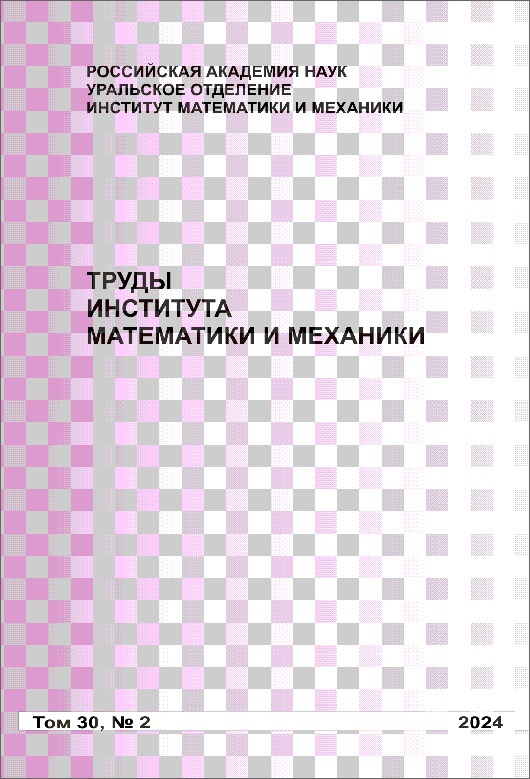|
This article is cited in 10 scientific papers (total in 10 papers)
Controlled Volterra functional equations and the contraction mapping principle
V. I. Sumin
Lobachevski State University of Nizhni Novgorod
Abstract:
Earlier the author proposed a rather general form of describing \it{controlled initial-boundary value problems} (CIBVPs) by means of Volterra functional equations
$$ z(t)=f\left(t,A[z](t),v(t)\right),\quad t\equiv \mathrm{col}\{t^{1},\ldots,t^{n}\} \in \Pi\subset{\mathbb R}^n,\quad z\in L_p^m\left( \Pi \right), $$
where $\Pi$ is a given bounded set, $f(.,.,.):\Pi \times {\mathbb R}^l\times {\mathbb R}^s\rightarrow {\mathbb R}^m$, $v(.) \in {\mathcal D} \subset L_k^s$ is a control, and $A:L_p^m\left( \Pi \right)\rightarrow L_q^l\left( \Pi \right)$ is a linear operator with the Volterra property on some system $T$ of subsets of $\Pi$ in the sense that for any $H\in T$ the restriction $\left. A \left[z \right] \right |_H$ does not depend on the values of $z| _{\Pi\backslash H}$; here $p,q,k\in \left[ 1,+\infty \right]$. This definition of the Volterra property is a multidimensional generalization of Tikhonov's known definition of a functional operator of Volterra type. Various CIBVPs for nonlinear evolution equations (parabolic, hyperbolic, integrodifferential, with delays, and others) are reduced by the inversion of the principal part to such functional equations. This description of CIBVPs is adequate for many problems of the theory of optimal control of distributed parameter systems. In particular, based on this description, the author found a scheme for deriving sufficient conditions for the stability (under a perturbation of the control) of the existence of global solutions to CIBVPs. The scheme employs the extension of local solutions (i.e., solutions on sets $H\in T$) of a functional equation along a finite chain of sets from the family $T$ ordered by inclusion. This process is realized with the use of a special theorem of the existence of local solutions based on the contraction mapping principle. In the case $p=q=k=\infty$, under natural assumptions, the possibility of applying this principle is provided by the fact that the right-hand side operator $\Phi_{v}[z\left(.\right)]\left(t\right)\equiv f\left(t,A[z](t),v(t)\right)$ satisfies the operator Lipschitz condition with a quasinilpotent “Lipschitz operator”. This allows to introduce, using well-known results from functional analysis, a norm in the space $L_{\infty}^m(H)$ equivalent to the usual norm in which the right-hand side operator is contractive. In the general case $1\leq p,q,k\leq\infty$, which covers a much wider class of CIBVPs, the right-hand side operator may not satisfy such operator Lipschitz condition. In this case, the introduction of an equivalent norm of the space $L_p^m(H)$ required for the application of the contraction mapping principle is provided by \it{the theorem on an equivalent norm} proved in the paper. The theorem is based on the notion of \it{superequipotential quasinilpotency} of a family of linear operators acting in a Banach space. A constructive general test is proved for the superequipotential quasinilpotency of a family of operators acting in a Banach ideal space of measurable functions. Sufficient conditions of superequipotential quasinilpotency, which are convenient for applications, are obtained in the case of Lebesgue spaces.
Keywords:
controllable Volterra functional equation, contraction mapping principle, equipotentially quasinilpotent family of operators, theorem on an equivalent norm.
Received: 15.12.2018
Revised: 03.02.2019
Accepted: 05.02.2019
Citation:
V. I. Sumin, “Controlled Volterra functional equations and the contraction mapping principle”, Trudy Inst. Mat. i Mekh. UrO RAN, 25, no. 1, 2019, 262–278
Linking options:
https://www.mathnet.ru/eng/timm1615 https://www.mathnet.ru/eng/timm/v25/i1/p262
|

| Statistics & downloads: |
| Abstract page: | 277 | | Full-text PDF : | 59 | | References: | 38 | | First page: | 4 |
|




 Contact us:
Contact us: Terms of Use
Terms of Use
 Registration to the website
Registration to the website Logotypes
Logotypes








 Citation in format
Citation in format 
